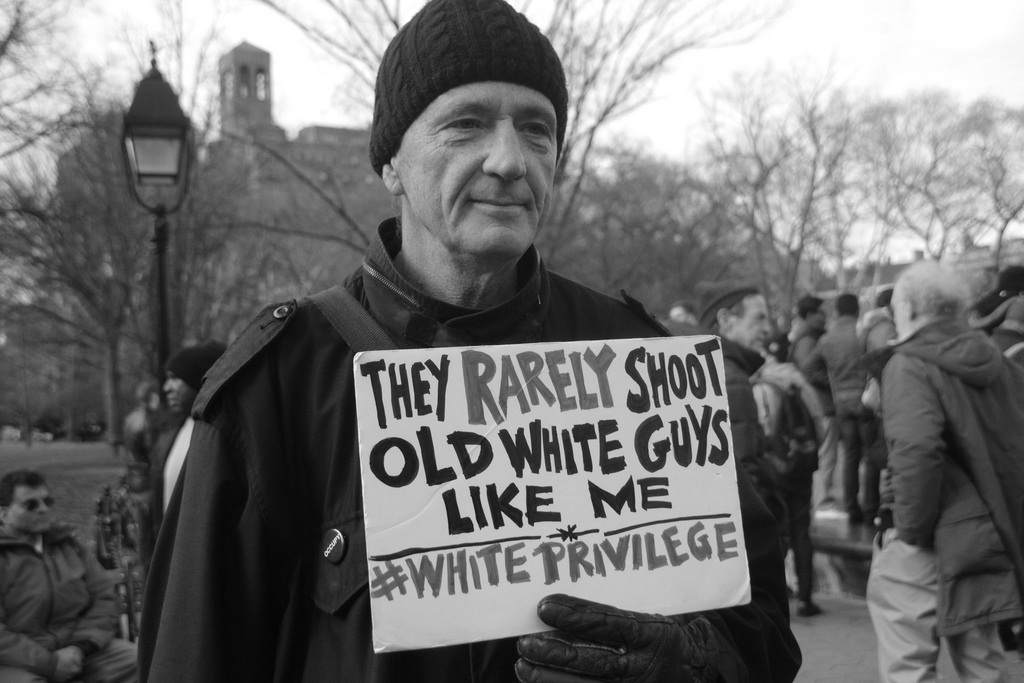No, not that p-word. I’m talking about privilege.
More specifically, white privilege.
White privilege is defined by Walter Kendall, author of Understanding White Privilege, as “an institutional (rather than personal) set of benefits granted to those of us who, by race, resemble the people who dominate the powerful positions in our institutions.” But, those are just words. And words can be easily argued with.
Let’s look a bit deeper at how white privilege impacts life in our country.
I am a white, middle-class, educated woman.
I can go to the grocery store and find products for my hair type and skin type in the regular aisle, not set apart. I can turn on the television and find people who look like me and whose lives look like mine. I click on the news and I see the majority of people who are making decisions for the people of this country look like me. (This doesn’t even begin to address the inequality between men and women in those roles—that discussion is for another time.)
But, the reality is that the America that the Founding Fathers envisioned and purposefully built was for white people—particularly for wealthy, or privileged, white males.
I know that this makes many people angry. You might be angry with me right now. It’s okay. You are probably thinking things like, “She’s saying I’m part of the problem, but I’m not a racist!” or even, “Why do I get blamed for things that people did hundreds of years ago? I didn’t create this system!” Or you might even be thinking, “Wait a minute! I have plenty of black friends and I know she isn’t talking to me!”
White privilege is real. Just like climate change is real.
White privilege is about the assumptions we make about our society and the people in it. Those seemingly innocuous assumptions that we make about people based on the color of their skin or their cultural background.
Pretending that it doesn’t happen while surrounding ourselves with people of similar complexion and similar backgrounds is still part of the problem. And while we cannot change where white privilege came from, we can accept that this is where we are in our society and make things different for future generations.
Maybe you are just not sure of what you can do or where to even start.
Here are some baby steps that we can all take:
Acknowledge it: White privilege is deeply embedded in American culture. It is about an advantage that has been assumed for so long it has become an expectation. This is not about hard work or intelligence or the American dream. It’s about an uneven playing field—a stacked deck. The thing is, once you see white privilege for what it is, you cannot unsee it. And it has to be acknowledged, because it is as real as the shrinking glacial ice sheets.
Recognize it: We have to see privilege for what it is—and where it is. Examples like Band-Aids only being available in white-ish flesh tones or having a separate grocery aisle for “ethnic” food demonstrate how white-centric our culture is. The fact that many whites are unaware of this privilege, or argue its existence, only underscores the fact that “normal” in American culture is based on a norm of whiteness.
Talk about it: The first conversation that I had with my family about white privilege was messy. It brings up feelings of defensiveness and guilt. Those are feelings that need to be identified and talked through before we can ever begin to look at deeper social constructs like institutional racism or generational poverty. Recognizing privilege for what it is does not negate anyone’s hard work, education, or accumulated wealth. But recognizing that the access to power and resources that goes along with a white-centric society does provide some context for the cultural norms that we perpetuate.
Challenge it: Asking why is a great starting point. Why do we do this? How did this start? What is the social construct that supports this? How can I make a difference in my own small circle of influence? Challenging the thinking of people around us does not have to be aggressive or confrontational, but it has to happen if we are going to make any changes.
Our cultural identity comes from all of the generations before us and their collective experiences, but we cannot cling to practices and beliefs that we now know to be wrong.
The rights of life, liberty, and the pursuit of happiness are promised to all people and must be protected. Not just for a few. Not just for the privileged. For all people.
In order for that to happen, our eyes have to be open and we have to see things as they really are. We have to identify it. And we have to name it for what it is.
Read more about white privilege, or watch this:
~

 Share on bsky
Share on bsky







Read 1 comment and reply